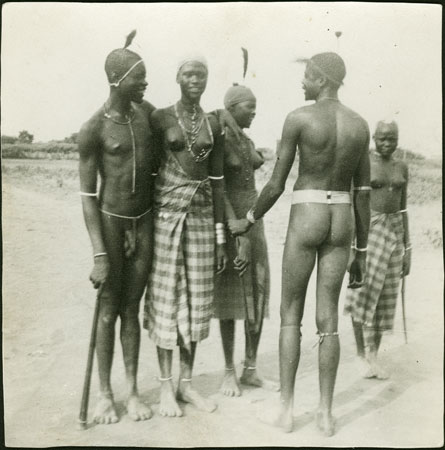Mandari courting couples

109 x 107 mm | Retouched
There are records relating to alternative images that we do not have scans for in the database:
1998.97.56.1 - Negative film nitrate , (56 x 56 mm)
1998.97.56.1 - Negative film nitrate , (56 x 56 mm)
Date of Print:
Unknown
Previous PRM Number:
JB.2.38
Accession Number:
1998.97.56.2
Description:
A full-length group portrait of two pairs of young Mandari courting couples, one with his arm around the girl.
The girls are wearing checked waist cloths and strings of neck beads, probably gifted to them by their male admirers.
One youth is wearing a set of waist bead strings, denoting a particular age set and the other is carrying a club.
Photographer:
Jean Carlile Buxton
Date of Photo:
1950 - 1952
Region:
[Southern Sudan] Bahr el Jebel Tali
Group:
Mandari Dari
PRM Source:
Ronald Carlile Buxton via Institute of Social and Cultural Anthropology
Acquired:
Donated 1988
Other Owners:
Jean Buxton Collection
Class:
Ornament , Textile , Weapon
Keyword:
Ornament Neck , Ornament Arm , Textile , Club
Documentation:
See Related Documents File. Buxton field notebooks in Tylor Library.
Primary Documentation:
Note on print reverse ms pencil - "Return to Miss Jean Buxton [home address given]"
Other Information:
In Some Notes on the Mandari of Equatoria Province, A.E.
Sudan, (typescript notebook of c.1951 in Tylor Library, Institute of Social and Cultural Anthropology, University of Oxford), book I, page 30, Jean Buxton notes that 'Although they are naked, the wearing of beads is very popular.
These are of two different types and mean different things.
There are large strings of circular waist beads of different colours, which have a special significance and denote different age grades, and which can only be worn by an individual when he is in the appropriate age-grade.
The other kind of beads is usually worn around the neck, and is purely ornamental.
They can be worn by anyone, although there are usually set fashion trends which dictate which type of beads it is smart to wear to be up-to-date.
These latter consist of small strings of beads, often worn the whole way up the throat...' [Chris Morton 26/11/2004]
Recorder:
Christopher Morton 17/1/2005 [Southern Sudan Project]

